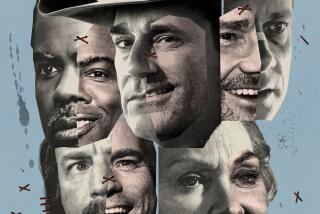MOVIE REVIEWS : ‘Hoffa’: Negotiating a Complex Life : Saga of Teamsters Leader Is Dark, Sinister, Brooding
- Share via
Jimmy Hoffa never drove a truck for a living but he turned the Teamsters into the largest and strongest union of its day. He trafficked with thugs but used a sophisticated grasp of the intricacies of trucking industry economics to consolidate his gains. A devoted family man who never developed champagne tastes, he disappeared on July 30, 1975, probably a victim of organized crime. He was a complex, contradictory personality whose life might have made an exceptional movie. It hasn’t quite.
“Hoffa” (citywide and rated R for violence and strong language) is a very impressive piece of work in a number of ways. Dark, sinister and brooding, it uses Jack Nicholson’s convincing acting, Stephen H. Burum’s panoramic cinematography and Danny DeVito’s polished, energetic direction to create a stark, brassy epic of union history. But that is only half the story.
For “Hoffa” turns out to be as misdirected as it is passionate, as one-note dramatically as it is potent cinematically. A take-it-or-leave-it biography that disdains all the conventions of the form, it ends up outsmarting itself, an attempt at myth-making that succeeds only in leveling the object of its affections.
David Mamet wrote the “Hoffa” script, and it is a laconic, enigmatic piece of work, displaying the grace with spoken language that marked “Glengarry Glen Ross” but troublesome in terms of structure and character development. With a scorn for the conventional signposts of biography, “Hoffa” doesn’t allow us a single date for any of its actions, and, except for the briefest glimpse of the Detroit News, not a single city is named as a location. Don’t tie me down, the script seems to be saying, I’m after bigger, more legendary game.
The same kind of contempt for the standard issue is displayed in the development of Hoffa’s character which, in a word, doesn’t. Though he changes physically in the five decades the film covers, thickening into a kind of large, ossified lizard, Hoffa is exactly the same one-dimensional last angry man at the end of the film as he was at the beginning, a kind of sacred monster who would cut a deal with the devil if it advanced the rights of the working man.
Aside from the fact that this simplistic portrayal does a disservice to the real man (who, though you wouldn’t know it, could outfigure any CPA), its lack of dramatic arc makes the film increasingly tedious to watch. And because Mamet also has no use for any attempt to get us inside Hoffa’s head, to give so much as a hint as to what turned him into this banshee with a heart of gold, he remains a cipher to the grave. All the audience is left with are snapshots of repetitive tough-guy behavior, a scenario that is too limited to hold anyone’s interest for a 2-hour-and-20-minute length.
During “Hoffa’s” first hour, however, these problems are not very visible or very troublesome. Though the film opens in the 1970s, with the union leader and close (albeit fictional) associate Bobby Ciaro (DeVito) waiting for a meeting in a restaurant parking lot, the story soon shifts into flashback and shows us Hoffa’s start as a firebrand organizer of fearful truckers.
Hopping into Ciaro’s cab somewhere in the Midwest sometime in the 1930s, Hoffa displays personal fearlessness and a passion to help drivers improve their lot, no matter what it takes. His bravado costs Ciaro his job, but Hoffa soon takes the driver under his wing as he starts to organize the dispirited souls cowed by a management that treats them “like they were just part of the truck.”
America’s turbulent, violent labor history has been rarely touched by films (John Sayles’ 1987 “Matewan” was an excellent exception) and DeVito takes full advantage of that setting. Always a director with a feeling for the dark side, he and cinematographer Burum create a vivid, compelling portrait of large-scale class warfare, from angry confrontations in rainstorms to apocalyptic pitched battles with management goons. Though he has a weakness for showier shots than he really needs, DeVito emerges here as a director of impressive visual scope and flair.
Helping him quite a bit is Jack Nicholson’s strong performance, flat Midwestern accent and all, as the choleric union leader. It is, at least initially, a riveting portrait of a man with a formidable force of will who never ever doubted himself, a man who liked the fact that “life’s a negotiation, it’s all give and take” because he felt sure he’d always come out on top in a situation like that.
But once Hoffa the man achieves power, “Hoffa” the movie, having decided against showing either the details of that achievement or its cost in terms of union democracy, finds itself with nowhere else to go. While there is no attempt to hide Hoffa’s association with the mob, represented by the fictional Carol D’Allesandro (Armand Assante), the issue of who controlled whom is dealt with superficially and does not turn out to make for very compelling drama.
Similarly, attempts to mythologize Hoffa as a hero who was brought low by the power elite (epitomized by Bobby Kennedy, weakly portrayed by Kevin Anderson) because he single-handedly led the Teamsters into the middle class are simplistic and unconvincing. Maybe the sad truth about Jimmy Hoffa is that notwithstanding his power, his temper and his mysterious disappearance, he is not the best of subjects for a major motion picture after all.
‘Hoffa’
Jack Nicholson: James R. Hoffa
Danny DeVito: Bobby Ciaro
Armand Assante: Carol D’Allesandro
J.T. Walsh: Fitzsimmons
John C. Reilly: Pete Connelly
Kevin Anderson: Robert Kennedy
An Edward R. Pressman production, in association with Jersey Films, released by 20th Century Fox. Director Danny DeVito. Producers Edward R. Pressman, Danny DeVito, Caldecot Chubb. Executive producer Joseph Isgro. Screenplay David Mamet. Cinematographer Stephen H. Burum. Editors Lynzee Klingman, Ronald Roose. Costumes Deborah Scott. Music David Newman. Production design Ida Random. Art director Gary Wissner. Set decorator Brian Savegar. Running time: 2 hours, 20 minutes.
MPAA-rated R (violence and strong language).
More to Read
Only good movies
Get the Indie Focus newsletter, Mark Olsen's weekly guide to the world of cinema.
You may occasionally receive promotional content from the Los Angeles Times.










